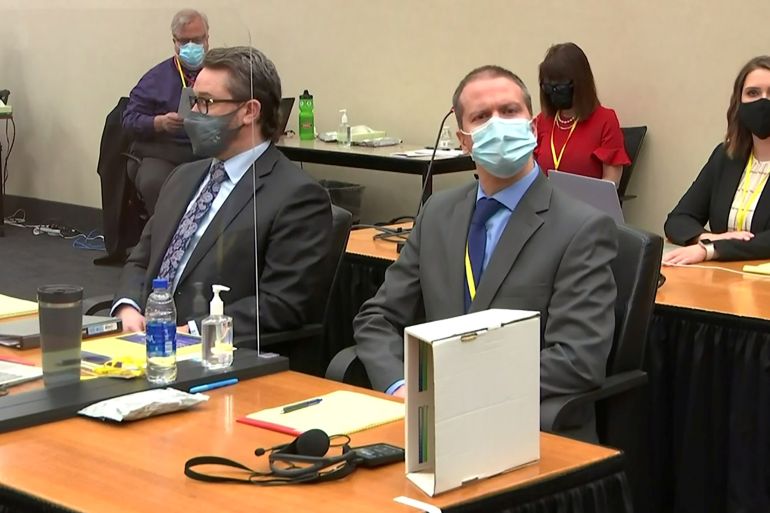Prosecutor: Chauvin’s knee on Floyd was ‘grinding and crushing’
The defence and prosecution give opening statements in the trial of the police officer accused of killing George Floyd.

Opening statements began on Monday in the trial of Derek Chauvin, the former Minneapolis police officer on trial for the alleged murder of George Floyd, the man whose death sparked protests across the world against racism and police brutality.
Both the prosecution and defence laid out their narrative of the events of Floyd’s May 25 arrest and death, discussing how their witnesses – who number in the hundreds – will prove their theories.
Keep reading
list of 3 itemsChauvin trial: Jury set, arguments to begin on March 29
‘Stakes extremely high’ as US readies for Chauvin trial
The trial began with the infamous video of the arrest, which shows Floyd’s death.
Jerry Blackwell, a prosecutor with the attorney general’s office, described Chauvin, who is white, as engaging in excessive force during the arrest and prevention of others from assisting Floyd, who was Black, as he lay dying.
Blackwell showed an image of the arrest taken on a mobile phone, which showed Chauvin’s knee on Floyd’s neck, “grinding and crushing him until the very breath”.
Floyd died while Chauvin had his knee on Floyd’s neck for nearly nine minutes, an event caught on camera in a widely seen video, which became a rallying cry for demonstrators.

Blackwell said Minneapolis’s chief of police would testify that Chauvin’s conduct did not agree with the training he was provided as a member of the police force.
Chauvin is charged with unintentional second-degree murder, third-degree murder and second-degree manslaughter.
The former police officer pleaded not guilty to the charges. He could face up to 40 years in prison if convicted on the most serious charge, though Minnesota sentencing guidelines suggest it would be closer to 10.75 to 15 years.
Al Jazeera’s Gabriel Elizondo, reporting from Minneapolis, said Monday was the day for both the prosecution and defence team to lay out their respective arguments.
Elizondo said the video of Floyd’s death “is going to be key in the prosecution’s case to the jurors”, while Chauvin’s lawyers argued that “there is more than one side to this story”.
“This case is about more than 9 minutes and 29 seconds,” defence lawyer Eric Nelson told jurors, referencing the length of the widely-seen video.
Nelson said Chauvin’s conduct was in line with police training and depicted the circumstances of the arrest as a high-risk endeavour for Chauvin and the three other officers on the scene: J Alexander Kueng, Thomas Lane and Tou Thao, who will stand trial separately.
Nelson said 38th Street and Chicago Avenue, the intersection where Floyd was arrested, is a “high crime” area. As officers conducted the arrest, the crowd that watched them grew more aggressive, raising tensions, he said.
He also said that Floyd’s size – he stood almost two metres (6ft 6in) and weighed 101kg (223lbs) – made the arrest difficult, prompting Chauvin’s response.
“Use of force is not attractive, but it is a necessary component of policing,” Nelson said.
Demonstrators peacefully stood outside the Hennepin County Government Center, the location of the trial. They also have remained at the intersection where Floyd died, renaming it “George Floyd Square”, though authorities intend to retake the square.
Reverend Al Sharpton and Benjamin Crump, a Floyd family lawyer, took a knee outside the government centre ahead of the trial.

“We are taking a knee for eight minutes and 46 seconds, and [what] we want you to think of during that time, [is] why Chauvin didn’t in that time get his knee up,” Sharpton said at the news conference.
Judith Browne Dianis, a civil rights attorney and executive director of the Advancement Project non-profit group, told Al Jazeera that many people are hopeful the case can bring about change.
“Derek Chauvin is on trial, but this case is about much more because this isn’t the first case that we have seen a police officer killing a Black person in the United States,” she said.
The case is expected to take around one month, given its lengthy witness list, though it could conclude sooner.